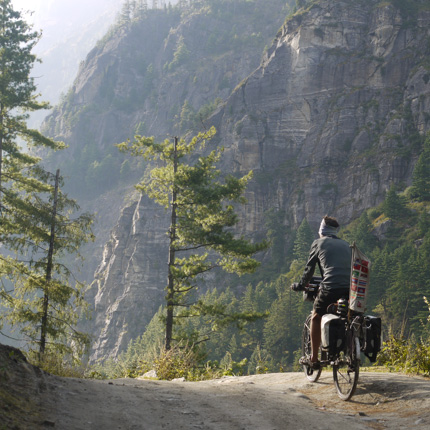I like your new take on JOGLE, taking in the Isles of Scilly and Orkney! What do these segments require in addition to the standard land route?
These segments will be a real test for us! Both sea crossings present their own challenges, requiring additional skills to a traditional land cycle: sea survival and crisis operations, use of VHF radio and satellite phone, first aid at sea and seamanship. The challenge of routing and interpreting weather, currents and tides will be constant and imperative.
Thankfully we have plenty of sounding boards in the form of experienced ocean rowers, ferry operators and fishermen sailors. We plan to have a pilot vessel directing the show at each crossing and navigating us through the safest route on the day. The people guiding us live in these locations, have fished these waters all their lives and have taken sea swimmers across before.
Luckily, some of our team are naturals in water! Isaac and Lukas both took part in the Talisker Whisky Atlantic Challenge, the world’s toughest row, in 2018. Furthermore, Isaac has a strong background in swimming, and swam the Channel as part of a relay team whilst at university. Sal is an experienced kayaker who has been on many extreme adventures all over the world. With this wealth of knowledge, the two Alexes are in safe hands!
What kind of impact and legacy do you want your expedition to have? How do you see it impacting the country’s lack of public green spaces?
The most important thing we can each do is recognise the need to restore nature and biodiversity, taking the time to understand why this is a problem. It is this understanding that has driven our ambitions to produce an educational documentary and share the voices of the people who are already working on solutions. We wish for every single person that comes across our campaign - whether by watching the film, hearing our talks or seeing our posts on social media - to take action in their own lives and lead to large-scale societal change.
Thanks to platforms such as Adventure Uncovered helping to spread our and other similar initiative and messages we are able to share our knowledge and solutions in a concise format, and we wish to inspire others to run their own efforts. Furthermore, if our film is screened at COP26, this will enable us to reach the top decision makers directly.
At a grassroots level, enough people focusing on the regeneration of green spaces in their daily lives will eventually influence policymaking and investment towards reversing the current decline of these natural habitats and biodiversity. Given enough noise, this topic will rise up the public agenda, which will only be beneficial for everyone. Last year the UK government pledged to protect 30% of the UK’s land and sea for nature by 2030. Ultimately, the more practical and actionable the steps that are available, the more likely it is that our audience will take them.








